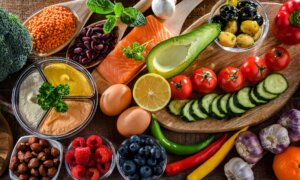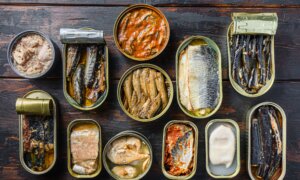What does it take to be as healthy as possible nowadays? “Being bold enough to reject social norms and do things a little differently,” according to Dr. Casey Means. That is the message of her book “Good Energy: The Surprising Connection Between Metabolism and Limitless Health.”
In health class, we all learned that our bodies, like machines, need “fuel” to function well. Our modern world, full of processed food and environmental toxins, has made good, clean fuel increasingly scarce, making it harder to maintain well-functioning bodies.
However, according to Means, good fuel is key to having “good energy,” or good metabolic health. Overall health, she writes, is determined by our metabolism—how our cells create and use energy. The American health care system has lost sight of this basic fact, she notes, and our health as a nation is in grave danger.
“I believe Americans know that something is not right when it comes to the health trends of children, adults, and the elderly,” Means told The Epoch Times. “The message of ‘Good Energy’ helps people connect the various dots in why this is so, and I think there is a big appetite for that information. Americans want to be healthy, but the system is set up for poor health.”
Six out of 10 Americans live with chronic disease—up from four in 10 in the 1990s. The population is becoming “sicker, heavier, more depressed, and more infertile,” Means writes in “Good Energy.” She contends that doctors are overlooking the root cause of our declining health.
Many Americans now assume that declining health is a normal part of aging, and illnesses that were once unusual are now commonplace, she writes. About 93 percent of Americans have at least one concerning metabolic marker, such as a high waist measurement, high cholesterol levels, high glucose levels, or high blood pressure, she notes. Fatty liver disease, prediabetes, and obesity are now common in children and teens, when only a generation ago these conditions were unheard of in this age group.
The root cause of these conditions and nearly all disease is metabolic dysfunction—or what Means calls “bad energy.” She abandoned the world of traditional medicine and her career as a surgeon when she observed her colleagues treating sick patients as collections of symptoms rather than as whole beings whose multiple maladies often stemmed from one root cause.
Our bodies’ systems are connected, and the current approach of “siloed” disease treatments doesn’t treat the problem of bad energy, she writes.
Who Is Casey Means?
Means received her medical degree from Stanford University, then trained in head and neck surgery at Oregon Health and Science University before leaving traditional medicine “to devote her life to tackling the root cause of why Americans are sick,” she writes.
In 2021, Means experienced a personal tragedy that reinforced her mission. She witnessed her mother, Gayle Means, die of pancreatic cancer, “a preventable metabolic condition,” she notes in the book’s dedication. Her mother’s death followed years of suffering from prediabetes and high blood pressure. At the time of her passing, Gayle Means was taking five medications and seeing five specialists—a regimen that, ironically, made her “healthier” than the average American her age. The average American over 65 sees 28 doctors in their lifetime, and 14 prescriptions per American are written each year, Means writes.
Mounting illness and numerous medications have become almost a “rite of passage” into old age in the United States, Means told host Tucker Carlson during an interview on his show in August. But Means, who wrote “Good Energy” with her brother, Calley Means, wanted to deliver the good news that “for the first time ever, we can monitor our metabolic health in great detail and learn how to improve it ourselves.”
The ‘Good Energy’ Strategy
“Good Energy” has three parts. The first section of the book reveals “the truth about energy.” Part two is about “creating good energy,” and part three is a practical “good energy plan.”
Throughout the book, Means explores several key themes:
- The contrast between “siloed health” and “energy-centric health”
- How “bad energy” serves as the root cause of disease
- The importance of trusting oneself rather than unquestioningly following doctors’ advice
In part two, Means highlights five factors that contribute to improved metabolic health:
- Eating a nutritious diet
- Getting good sleep
- Moving regularly
- Avoiding toxins
- Practicing “fearlessness”
Modern life—with its ultra-processed foods, ubiquitous screens, sedentary jobs, and forever chemicals—makes following these practices difficult, but Means aims to provide readers with strategies to overcome these modern health hurdles.
In the chapter “Replenishing What Modernity Took Away,” Means covers how to avoid toxins, how to incorporate movement into each day (rather than “working out”), and why exposing ourselves to extreme heat and cold can help.
“Nearly every ‘norm’ in our modern world is not healthy: sitting all day, bright lights at night, ubiquitous ultra-processed foods, staring at our phones multiple hours a day, rarely going outdoors,” Means told The Epoch Times.
“There are also many systemic factors that make it very challenging to be healthy in the modern world, which we need to counteract through local and national advocacy through our communities and policy.”
It can be hard to stay healthy in today’s world because we often need to deviate from what everyone else is doing. This means setting limits and being willing to stand out—to be the “oddball”—such as using a standing desk, making your kid’s snacks at home, or wearing special glasses to block blue light at night, she noted.
Healthy habits that may seem odd in our industrialized world give our cells, and thus our bodies, “the biological needs that modern industrial life has stolen,” she writes.
Fitness Made Simple
Means advocates incorporating movement into everyday life rather than relying on gym workouts. She offers three “simple rules” for staying active:
- Walk at least 7,000 steps daily, spread throughout the day. Aim for 10,000 steps eventually.
- Get your heart rate above 60 percent of your maximum for at least 150 minutes a week. (That’s 30 minutes, five days a week.)
- Lift heavy things multiple times per week in a way that hits every major muscle group.
Embracing Temperature Extremes
Another seemingly “oddball” practice Means recommends is exposing the body to large temperature fluctuations (through, for example, saunas, hot yoga, and cold plunges) each week to benefit metabolism and build resilience. She suggests:
- Ending showers with two minutes of cold water
- Jumping into cold bodies of water
- Joining a cold-plunging or sauna group or a facility with a hot tub
- Practicing hot yoga
- Exercising in hot weather (while taking safety precautions)
The ‘Highest Level’ of Good Energy
Sadness, fear, and stress are part of modern life thanks to today’s technological connectivity, Means writes. While in the past, people were concerned mainly with the goings-on in their immediate surroundings, now, thanks to the 24/7 news cycle, “the traumas and fears of eight billion others have all become ours to process.” Levels of depression, anxiety, and stress have skyrocketed, she observes, and stress triggers bad energy by causing:
- Chronic inflammation
- Oxidative stress
- Mitochondrial dysfunction
- High glucose levels
- Worsening metabolic biomarkers
The highest level of good energy is “fearlessness,” according to Means. This is her term for the ability to live in a stressful world without letting fear and anxiety affect one’s mental and physical health. Her suggestions for managing stress include (among others) meditation, yoga, journaling, limiting cell phone use, and spending time in nature and among friends.
Choosing to avoid the stress of the modern world “involves recommitting to many natural basics that modern living has separated us from,” she writes.
The Importance of Organic, Whole Foods
Means told The Epoch Times that if readers take away only one thing from her book, she hopes it will be her recommendation to eat more organic and less ultra-processed food. “This means getting away from all the added sugars, refined grains, and industrial seed oils that make up the majority of what’s in the grocery store,” she said. “This will go incredibly far in helping build a healthier body.”
These now ubiquitous ingredients were not a part of the human diet until relatively recently, Means writes. In the past 75 years, our diets have changed drastically. She presents facts on why some of the most common foods may be damaging our health, such as:
- One bottle of Coke contains as much added sugar as the average child living 150 years ago would have eaten in an entire year.
- The proteins in modern grains can contribute to “leaky gut,” and most grains grown in the United States are now treated with “toxic pesticides.”
- Soybean oil, which has inflammatory properties, is now the largest source of calories for people in the United States. Consumption of this oil has increased by a thousand times since 1909.
We also should avoid any food that contains “an ingredient that is not an obviously recognizable food,” Means writes. Helpfully, she includes extensive lists of what readers should eat, with tips on stocking the “Good Energy kitchen” and more than 35 recipes to get readers started on their “Good Energy plan” for optimal metabolism and “limitless health.”














